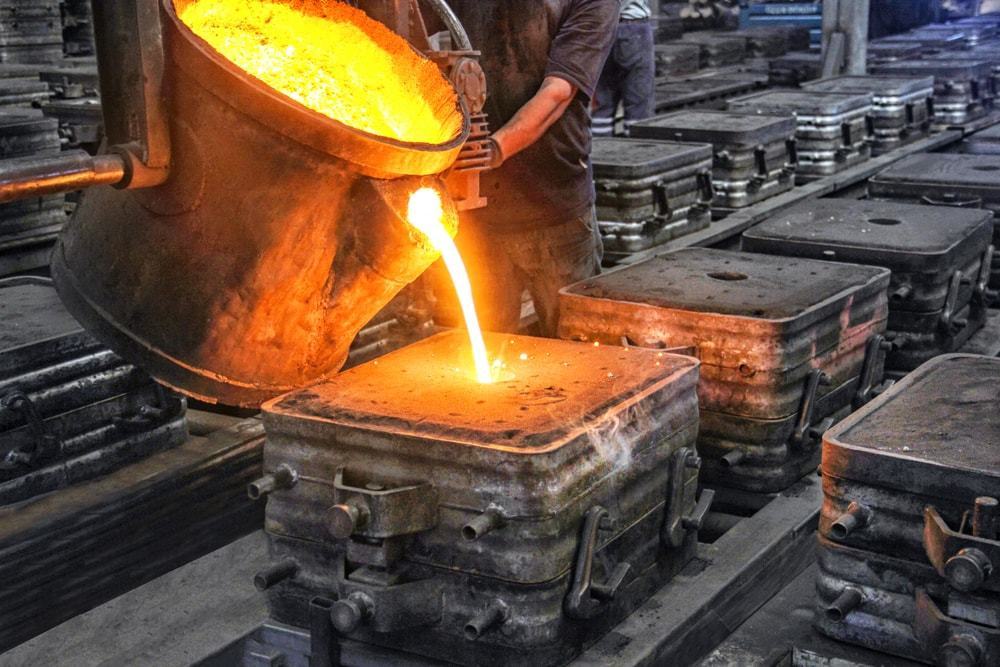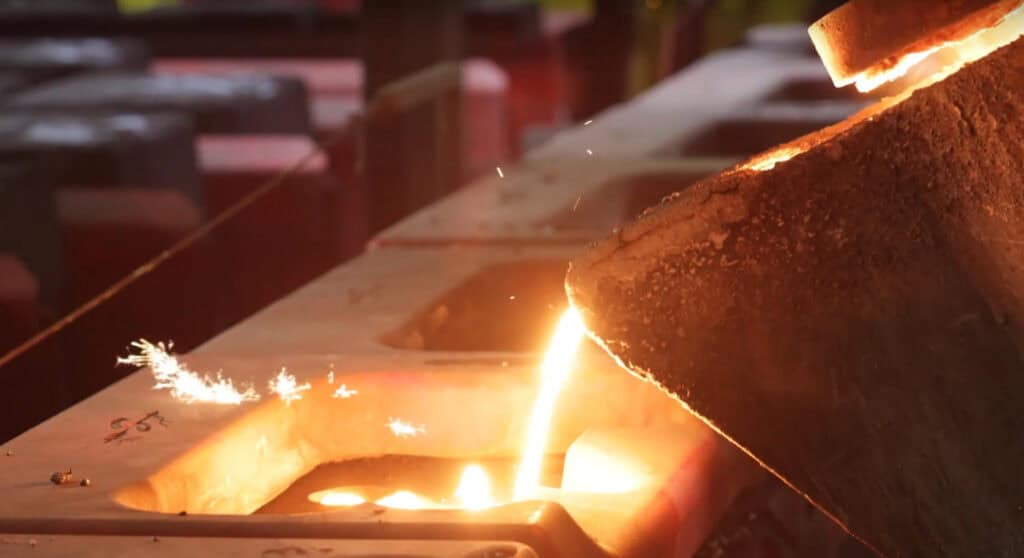What is an Aluminum Foundry in today’s industrial landscape
Wiki Article
Checking out the Duty of a Metal Foundry in Modern Production Processes
Metal foundries are critical in the landscape of contemporary production. They supply vital parts throughout different markets, adapting to the demands of industries like automobile and aerospace. Advanced methods such as 3D printing and automated casting have changed their procedures. Furthermore, sustainability has come to be a top priority, influencing their techniques. As these foundries progress, the implications for producing effectiveness and technology are considerable, elevating inquiries about their future trajectory in an ever-changing economy.The Advancement of Metal Casting Strategies

With the rise of automation, foundries took on techniques like die casting and lost foam casting, enhancing the production procedure and minimizing waste. Each evolution in metal casting strategies has accommodated the requirements of various markets, from auto to aerospace. As metal casting proceeds to breakthrough, the interplay in between technique and technology remains vital in conference modern production obstacles, ensuring that foundries flourish and adapt in an ever-changing landscape.
Integration of Advanced Technologies in Foundries
Although conventional metal casting approaches have actually offered the sector well for centuries, the integration of sophisticated innovations in foundries is reinventing the manufacturing landscape. Automation and robotics improve manufacturing processes, boosting performance and minimizing the danger of human mistake. Once difficult with standard approaches, technologies such as 3D printing allow for rapid prototyping and the production of intricate geometries that were. Additionally, information analytics and the Net of Things (IoT) allow real-time tracking and predictive upkeep, ultimately bring about minimized downtime and boosted efficiency. These developments likewise help with customization, permitting suppliers to respond rapidly to market demands. As sustainability comes to be a concern, the adoption of eco-friendly modern technologies, such as electrical melting heating systems and advanced sand reclamation systems, even more demonstrates the sector's dedication to advancement. Collectively, these modern technologies not just improve operational effectiveness yet likewise position foundries at the leading edge of modern production methods.The Effect of Product Science on Foundry Operations
Material scientific research plays an essential duty in boosting foundry operations, influencing both the choice of products and the total casting process. Advancements in product scientific research supply a much deeper understanding of the residential properties of metals and alloys, enabling foundries to pick one of the most appropriate materials for specific applications. This understanding boosts the efficiency and resilience of actors items, which is essential for fulfilling market requirements.Advancements in product formulations and ingredients add to boosted casting strategies, optimizing and reducing flaws production performance. The development of advanced metal composites and smart products allows foundries to generate lighter, more powerful elements, which are significantly demanded in various fields such as vehicle and aerospace.
Furthermore, material scientific research help in the recycling of steels, making processes more affordable and reliable. By leveraging the current searchings for in material scientific research, foundries can adjust to developing market needs, guaranteeing their competitiveness in a swiftly changing production landscape.
Sustainability Practices in Modern Metal Foundries
With the growing focus on ecological responsibility, modern-day metal foundries are significantly executing sustainability methods to lessen their ecological impact (Aluminum Foundry). One crucial technique entails the recycling of scrap metal, which not just lowers waste however also saves power and resources. Foundries are adopting sophisticated melting innovations that boost energy performance, subsequently reducing greenhouse gas discharges. Furthermore, using ecologically pleasant coverings and materials has actually gained grip, further minimizing dangerous exhausts throughout manufacturingWater preservation strategies, such as closed-loop air conditioning systems, are being carried out to minimize freshwater use. Numerous foundries are likewise buying renewable energy resources, like solar and wind, to power their procedures, thus reducing dependence on fossil fuels. Moreover, staff training programs concentrated on sustainability techniques promote a culture of ecological awareness within the workforce. These campaigns collectively contribute to a much more sustainable future for metal foundries while meeting the demands of eco-conscious customers.
The Future of Foundries in a Changing Financial Landscape
As the global economy progresses, foundries face a myriad of challenges and possibilities that will shape their future (Aluminum Foundry). The increasing need for lightweight products and advanced alloys demands technology in manufacturing methods and technical combination. Automation and wise production practices are ending up being crucial for boosting efficiency and lowering functional costs. Additionally, the rise of sustainability concerns forces foundries to adopt greener processes and recycling campaigns, straightening with international ecological goalsThe my sources economic landscape is likewise changing, with supply chain interruptions and rising and fall resources costs offering substantial obstacles. Foundries should adapt by diversifying their supply sources and buying products scientific research. Cooperation with industries such as eco-friendly energy and electric automobiles can promote development. Inevitably, the future of foundries will depend on their capacity to utilize technological innovations while continuing to be receptive to market characteristics and environmental imperatives, guaranteeing their importance in contemporary manufacturing.
Often Asked Concerns
What Types of Metals Are Typically Made Use Of in Foundries Today?
Typically used steels in foundries today consist of light weight aluminum, iron, steel, copper, and zinc. These products are favored for their diverse residential properties, making it possible for a vast array of applications in sectors such as automotive, aerospace, and building.Exactly how Does a Shop Ensure Quality Assurance in Its Products?

What Precaution Are Implemented in a Metal Foundry?
Metal foundries execute precaution consisting of personal safety equipment, ventilation systems to reduce breathing of fumes, normal security training for employees, emergency action procedures, and extensive tools maintenance to minimize dangers and guarantee a risk-free workplace.For how long Does the Metal Casting Process Normally Take?
The metal casting process usually takes a number of hours to days, depending upon variables such as the complexity of the mold and mildew, the kind of metal utilized, and cooling down times. Each task's needs substantially influence the period.What Industries Mostly Depend On Metal Foundries for Production?
Automotive, building, aerospace, and machinery markets mainly rely upon metal foundries for production. These markets make use investigate this site of cast metals for parts, making certain toughness and efficiency essential for their respective applications in production and setting up processes.
Metal foundries are crucial in the landscape of modern manufacturing. Aluminum Foundry. Typical metal casting methods have actually offered the industry well for centuries, the integration of sophisticated technologies in foundries is revolutionizing the manufacturing landscape. Advances in product science give a much deeper understanding of the residential or commercial properties of alloys and steels, allowing foundries to pick the most ideal materials for certain applications. With the growing emphasis on environmental responsibility, modern metal foundries are increasingly applying sustainability methods to reduce their ecological footprint. Automotive, aerospace, equipment, and Source construction markets largely count on metal foundries for manufacturing
Report this wiki page